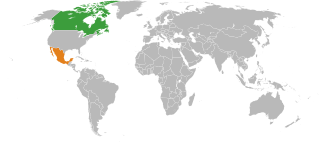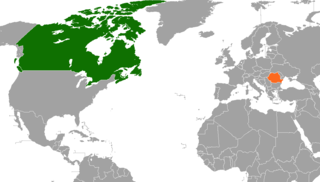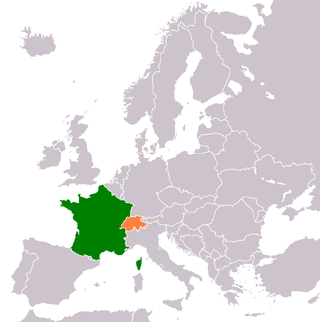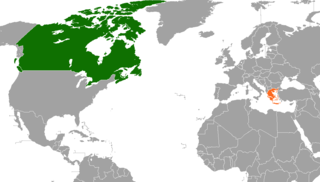 | |
Canada | Switzerland |
|---|---|
Canada and Switzerland have longstanding diplomatic relations. Both countries are members of the Francophonie and the United Nations.
 | |
Canada | Switzerland |
|---|---|
Canada and Switzerland have longstanding diplomatic relations. Both countries are members of the Francophonie and the United Nations.
In 1604, during the colonization of Canada, Swiss soldiers in the service of the French army arrived to the territory of New France. [1] Since the initial arrival, Canada has been a destination for Swiss emigrants. Switzerland's first honorary consulates in Canada were established in Montreal (1875), Toronto (1906), Vancouver and Winnipeg (1913). The two countries established diplomatic relations in 1945. In 1947, Switzerland opened a diplomatic legation in Ottawa and elevated it to an embassy in 1953. That same year, Canada upgraded its diplomatic legation in Bern to an embassy. [1]
Canada is Switzerland's second most important economic partner in the Americas. In multilateral forums, the policies the two countries adopt tend to coincide, leading to mutually beneficial cooperation. There are direct flights between both nations with Air Canada, Edelweiss Air and Swiss International Air Lines.
Both nations have signed several bilateral agreement such as a Treaty of Friendship, Commerce and Reciprocal Establishment (1914); Air Transport Agreement (1976); Cinematographic and Audiovisual Relations Agreement (1988); Cooperation Agreement for the Peaceful Uses of Nuclear Energy (1989); Mutual legal assistance treaty in criminal matters (1995); Social security convention, with arrangements with Quebec (1995); Extradition treaty (1996); and a Double taxation agreement (1998). [1]

Switzerland is not a member state of the European Union (EU). It is associated with the Union through a series of bilateral treaties in which Switzerland has adopted various provisions of European Union law in order to participate in the Union's single market, without joining as a member state. Among Switzerland's neighbouring countries, all but one are EU member states.

Brazil–South Africa relations are the bilateral relations between the Federative Republic of Brazil and the Republic of South Africa. Both nations are members of the BRICS, Cairns Group, G20, Group of 24, Group of 77 and the United Nations.

Diplomatic relations between Brazil and Canada were established in 1866. In addition to their bilateral relations, both nations are members of the G20, Organization of American States, United Nations and the World Trade Organization.

The nations of Canada and Mexico established formal diplomatic relations in 1944. Initially, ties between the two nations were dormant, but since the 1990s relations between Canada and Mexico have positively developed as both countries brokered NAFTA.

Canada and Romania have maintained bilateral relations since 1967. The two countries are members of OSCE, La Francophonie and NATO. Canada has an embassy in Bucharest, and Romania has an embassy in Ottawa and three consulates-general.

Bilateral relations between the Argentine Republic and Canada have existed for over a century. Both nations are members of the Cairns Group, G20, Organization of American States and the United Nations.

The current and historical relations between the Argentine Republic and the Republic of South Africa, for over a century. Both nations are members of the Cairns Group, G20, Group of 77 and the United Nations.

Canada and Japan have an amicable companionship in many areas. Diplomatic relations between both countries officially began in 1928 with the opening of the Japanese consulate in Ottawa. In 1929, Canada opened its Tokyo legation, the first in Asia; and in that same year, Japan its Ottawa consulate to legation form.

Ties between Canada and Lebanon date back to the Ottoman Empire; however, formal bilateral relations were first established in 1954. Canada is home to one of the largest Lebanese diaspora communities. Both nations are members of the Organisation internationale de la Francophonie and the United Nations.

Canada and Chile established diplomatic relations in 1892. Both nations are members of the Asia-Pacific Economic Cooperation, Cairns Group, Organization of American States, and the Organisation for Economic Co-operation and Development.

Diplomatic relations between France and Switzerland have traditionally been close, through important economic and cultural exchanges. Switzerland and France, share about 600 km of border and a language.

Romania–Spain relations are the bilateral relations between Romania and the Kingdom of Spain. Both nations are members of the Council of Europe, European Union, NATO and the United Nations. Spain has given full support to Romania's membership in the European Union and NATO.

Canada and Italy. Both nations enjoy friendly relations and are close allies and partners through their membership in the G7, G20, NATO and the Organisation for Economic Co-operation and Development. Relations also centre on the history of Italian migration to Canada; approximately 1.5 million Canadians claim to have Italian ancestry.

Canada and Mongolia countries established diplomatic relations on November 30, 1973. Canada has been represented in Mongolia through an embassy since 2008. Mongolia has an embassy in Ottawa, and in 2002 opened an Honorary Consulate in Toronto.

Diplomatic relations between Austria and Canada centres on the history of Austrian migration to Canada. Approximately 200,000 Canadians have Austrian ancestry. Both nations are members of the OECD and the United Nations.

Canada and Greece first exchanged ambassadors in 1942. Both countries are members of the Organisation for Economic Co-operation and Development, Organisation internationale de la Francophonie, Organization for Security and Co-operation in Europe, NATO and the United Nations. There is a strong Greek community living in Canada.

Denmark–Switzerland relations refers to the current and historical relations between Denmark and Switzerland. Denmark has an embassy in Bern. Switzerland has an embassy in Copenhagen, but only offers consular services from the Nordic Regional Consular Centre in Stockholm. Diplomatic relations between Denmark and Switzerland were established in 1945.

Canada and Portugal have friendly bilateral relations, the importance of which center on the history of Portuguese migration to Canada. Canadians of full or partial Portuguese ancestry number approximately 482,000 people. Both nations are members of NATO, the OECD, and the United Nations.

The nations of Mexico and Switzerland established diplomatic relations in 1945, however, both nations had established official contact in 1827. Both nations are members of the Organisation for Economic Co-operation and Development and the United Nations.

Canada and Vietnam have maintained bilateral relations since 1973. Both nations are members of the Asia-Pacific Economic Cooperation, Organisation internationale de la Francophonie and the United Nations.